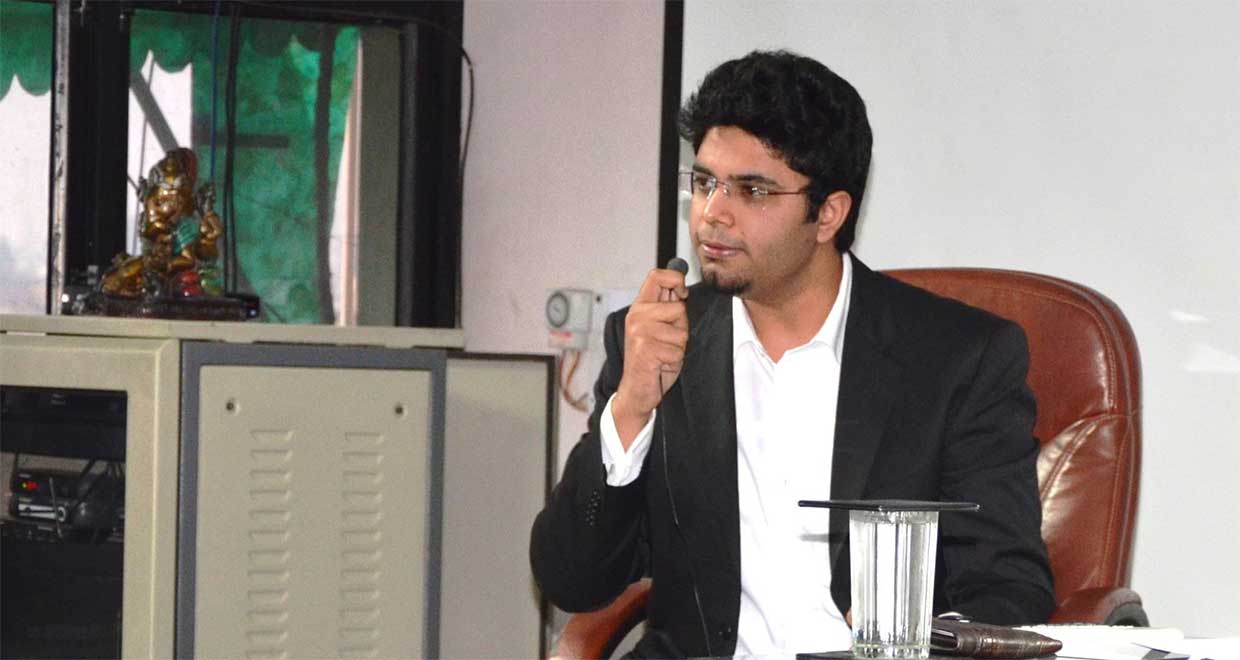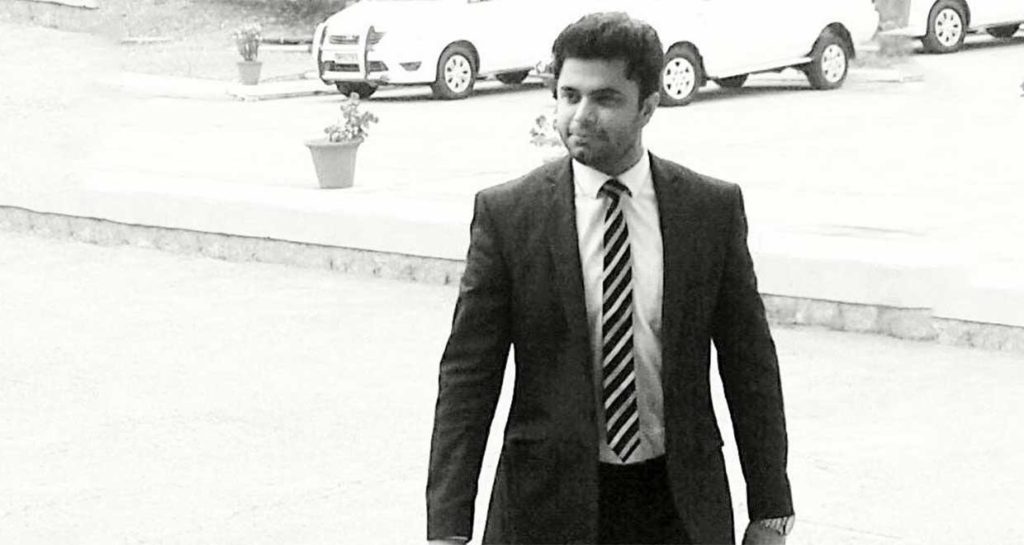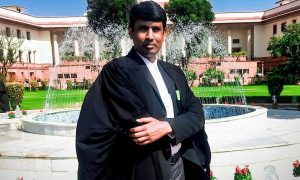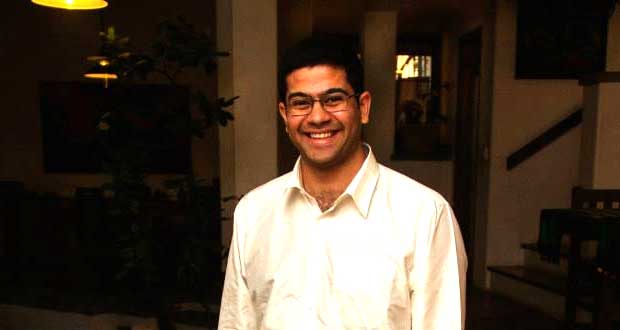Bharat Chugh graduated in law from Jamia Millia Islamia in 2011 and thereafter began practicing independently, taking up cases involving a wide range of legal issues, both Civil as well as Criminal.
In 2013, at the age of 23, he secured first rank in the prestigious Delhi Judicial Service, in all the three stages of the exam. He joined the Delhi Judicial services as the youngest to crack the exam in his batch. After three and a half years of being a magistrate, he recently decided to resign and return to the practice of law.
He is also an avid writer, currently working on two books and has various publications to his credit. He is also extremely passionate about mentoring ‘future judges’ and contributing to ‘judicial education’.
With his combined work experience both in litigation and Judgeship, he talks to us about:
- His introduction to the Legal Profession
- The need to reform the system of education
- Trials and Triumphs in Independent practice
- His experience of acing the Delhi Judicial Services
- His return to Litigation
How would you introduce yourself to our readers.
I graduated in law from Jamia Millia Islamia in 2011 and entered the bar at the age of 21; I practiced law independently for about one and a half years before being selected in the Delhi Judicial Service. I joined as a Civil Judge/Metropolitan Magistrate at the age of 23 years. After heading various criminal/civil judgeship assignments and an extremely fulfilling career as a judge, I decided to return back to my first love – the practice of law.
Tell us a bit about your initiation and experience with law.
My father was a practising lawyer, however my initiation in law was by no means a conventional one where a father hands over the baton to his son. My father’s law practice was brought to an abrupt halt when he had a massive stroke. I was 6 years old back then. As a result of which our family’s financial position became extremely precarious. I figured out that a regular school education was not only a needless (and avoidable!) expense, but also kept me from working. I had to contribute to my household in terms of finances, to keep it running. Yes! I am essentially a drop out and left regular schooling after 8th Standard. However, I continued my education through the Open School, frog leaped some classes and ended up gaining two years in the process. I kept working alongside.
By the age of 13-14 years, I was already accompanying my father to the court, drafting pleadings and arguments. When my classmates were learning the first principles of science and math, or just plain fooling around, I was handling my father’s law practise from a small seat near State Bank of India, right below Tis Hazari Old Nazareth Branch, under the stairs, which was our headquarters. It used to be the hub of all activity. A lot of learning in the actual ways of law happened by osmosis by just being in the middle of the action. Like any other 14 year old, I was at times happy on being excused from the drudgery of banal school work, and at others upset over being plucked rudely from the comforts and certainties of a normal childhood and all that comes with it. However, the early initiation in law, gave me a sense of fortitude and a ‘I can deal with whatever life throws at me’ attitude. I also taught computers, designed websites, worked in a Call Centre for a brief while, just to earn those extra bucks each month. However, what at first blush may appear to be a setback, turned out to be a huge advantage. The exposure to work ethic and law, at a very early age gave me a head-start. Though, I was missing school classes, I was learning some valuable life lessons. This was how I also managed to work my way through college and entered the profession.
“No two persons can learn something and experience it in the same way.” Can this is said to be applicable to the system of education in india both law and non-law? Tell us about your experience
I would agree with that. This also explains how different eye witnesses to the same incident give different accounts of it. This also emphasises the need to shift from a conventional text books based learning to experiential learning. It is quite meaningless to talk about isolated learning, especially in the discipline of law, divorced from experience. I must say my early initiation into law and education in the university of adversity and hard knocks of life, set me up in good stead for a career in law.
How do you say a law student can shape up his profile for litigation while still in law school? Does academic writing help?
A practising lawyer’s language is his foremost stock in trade. Law Students should work on their verbal as well as writing abilities. The ability to articulate even the most complex of issues clearly and succinctly is extremely important for a lawyer. The most successful lawyers are often the people who know the most and can present it most articulately. So while in Law School one should soak up as much as one can. Master your legal concepts. Discuss with your peers, ask questions, attend talks/lectures/seminars. Mooting is also extremely important. It gives one a sense of what it means to be in a court room. I participated in as many moots/quizzes as I could, and as they say, each drop of sweat in practice, saved blood in War. Mooting helps one develop that quality of being able think on one’s feet. It’s like being in a bouncy, even if you fall you don’t get hurt
Academic writing does not only look good on the CV, but helps one understand the first principles of law better. This also helps a student hone his drafting skills.
How important do you think are internships for a law student? What sort of internships did you do while in college?
Internships are extremely important. I interned with Sr. Advocate Sh. KTS Tulsi, Delhi Legal Services Authority. I also assisted Dr. Tamara Relis from the London School of Economics in some research projects. I also worked briefly as a correspondent for a Law Magazine ‘Legal Era’. All these internships give on quite an insight into law-in-action and an opportunity to survey the legal scene from the shoulders of giants. Throughout this, I also kept assisting my father in his law practice.
I also did a lot of legal aid work in Law School. Me and my friends started a 24 X 7 Legal Aid Cell, and worked in active collaboration with Delhi Legal Services Authority on a lot of projects. These projects gave us a ringside view of the law. The legal aid projects, which were totally selfless, did finally pay off. After I graduated, these cases would go on to be my first briefs and help me enormously in my initial phase as an independent practising lawyer. (Call it Karma!).
Soon after graduation, you began practising. What challenges did you face in the initial days at the bar? Any memorable trial court experiences?
Soon after I graduated, I observed a huge vacuum in traditional litigation scene. In this vacuum – I, as a 21 year old lawyer, saw opportunity. Everyone wants to be a Senior Advocate, but few are willing to pull all-nighters for an important case. I used to take up briefs for what people will consider a pittance, and tried to deliver the best service possible. My previous legal aid experience, publications and frequent court appearances ensured that briefs (though not too well paying initially!) still kept me busy.
During this time, I got to advise my clients on a wide range of legal issues including Criminal Law, Bail Applications, Injunctions, Conventional Civil, Contract, Property and Commercial litigation, Arbitration, Writ Petitions, Cases relating to Negotiable Instruments, Financial Fraud and Cheating, Matrimonial/Inheritance/ Succession/Guardianship and Custody Laws. I had many overseas clients to whom I rendered advise on various issues relating to interface of foreign law with Indian Legal system, enforceability of foreign judgments/awards in India, anti-suit injunctions, etc. Some very vexed issues indeed !
My favorite court room triumph came in a divorce case where I was cross examining. This was one of my first cross examination cases and I was still pretty naïve in the art. It was a case where I was appearing for the husband in a divorce petition, where he was seeking divorce on the ground of mental cruelty, as his wife had filed a false 498A/ 406 IPC case against him. She had alleged that my client had kept the entire articles of her stridhan and thereby committed criminal breach of trust. The witness in question was the lady’s brother, who had come to depose as to ‘how dutiful his sister was, and it was my client who had treated her cruelly’. As soon as that middle aged North Indian Punjabi Man came into the witness box, I could already see the anger in his gait. He appeared to be a man with an acute sense of honour, and I knew that this potentially might turn out to be his Achilles heel. I planned to hurt his credit and let him burn on his own. I asked him and I remember the exact words :
‘I put it to you that you have sold all your sister’s gold articles, and misappropriated the money!’ He just blew his top off on this one and launched a scathing attack on how insensitive I was. I politely reminded him to answer the question first. He blurted out “That is incorrect!” He further volunteered: “It still remains with us”. I immediately followed it up with the finishing coup de grace and drove the proverbial last nail in the coffin: “but you haven’t brought it to the court! You’re lying!”
He agreed to bring it to the court on the next date of hearing. I got these two answers recorded and concluded the cross examination. Through these two questions, we were able to demonstrate that the 406 IPC charge levelled against my client was false. If we would have asked him whether they had the gold or not directly, he would have clearly denied the same. My client won the case eventually, and this rather damning admission was one of the factors that weighed heavily with the court. A case won by a single question, and a killer argument; nothing compares to this high. One doesn’t need food or drink for days. This made me really happy and yes, the word spread fast, it fetched me a lot of good clients.
Prior to entering law school, did you ever wish to be a judge? What motivated you to apply for judicial exams?
Frankly, No. I shared the prevailing stereotype that one doesn’t get to be judge, unless one has more salt than pepper in his hair. I had never imagined I’d be a judge at 23. Since I was initiated into law when I was still 13-14 years, I always wanted to be a lawyer. In my fourth year of law, I got hooked to reading great Judges like Justice Chinappa Reddy, J. Krishna Iyer, J. Chandrachud, Lord Denning, Oliver Wendel Holmes, Lord Atkin & Justice H.R.Khanna, amongst many others. They inspired me a great deal. I was fascinated with how these judges breathed life into the dead letters of law by creative interpretation, fashioned remedies, where they apparently were none and did substantial justice. During this time only, I first got enamoured with the idea of being a judge. I have seen a lot of injustice and inequity early on in my life, my heart used to be rankled at each injustice. This was a beautiful opportunity to be a part of the solution and actually dispense ‘Justice’. A service that allowed one an enormous ability to correct injustices, contribute to the evolution of law, and at the same time, quench one’s penchant for writing.
What is the structure of the exam and how did you prepare for it? What motivated you to accomplish such a feat?
(Not only did Bharat secure the first rank in the Delhi Judicial Service Examination but he was also the youngest to do so.)
I started studying for the Delhi Judicial Service Exam, alongside law practice. I also took took preparatory classes with Mr. Rahul Yadav of Rahul’s IAS (fondly called ‘Rahul Sir’) at Mukherji Nagar, Delhi. The time at his classes did wonders and really helped me build a strong conceptual base and made my job much easier. I also started teaching my juniors in whatever time I was left with after court, classes and my own studies. It dawned on me that the best way to master a subject is to be able to teach it. All in all, I used to spend at least 8-9 hours a day either studying or teaching.
Armed with about a year of preparation, I appeared for the Delhi Judicial Service Examination (in short ‘DJS’). To give one a fair idea: DJS exam is not rote based exam and is based on real life cases, involving extremely vexed questions of law; issues that have arisen in the recent times before the courts. The examination has the distinction of being the toughest judicial service examination in the country. It is spread over three stages, first stage is the prelims – which is objective type; the second stage consists of 4 written exams which are subjective and test one’s ability to write well, followed by an interview/personality test. The exam is intensive and requires the student to don the mantle of a judge and write proper orders/judgments. The preparations are strenuous but extremely fulfilling for someone who likes to grapple with legal issues.
How did you feel when you got to know about your excellent scores in the judicial services? Please share with us your experiences thereafter.
On the day the results were declared, I was arguing a bail application before the High Court. I was ecstatic to find that I had not only cleared the exam but also aced the exam, in all the three successive stages. I was also the youngest at 23 (or rather, the least experienced!) in my batch. I must confess that I was on the horns of dilemma when the results came out. I enjoyed the practice of law immensely and it was hard to let go-of. After thinking days and nights on the trade-off involved, I finally came to the conclusion that ‘a life of reticence’ was a small cost to pay, to be given this opportunity to do so much good. The existing clients, who had reposed great faith in me, were naturally a little sad about it, but happily moved to my friends/associates who took my cases over, making my transition smooth.
At 23, I took the oath of office on 28th May, 2013. The text still sends adrenaline rushing down my system, each time I read it, and the text will be incomplete if I don’t reproduce it in full :-
“I, Bharat Chugh, having been appointed a judge, do solemnly affirm that I will bear true faith and allegiance to the Constitution of India as by law established; that I will uphold the sovereignty and integrity of India, that I will duly and faithfully and to the best of ability and knowledge and judgment perform the duties of my office without fear or favour, affection or ill- will and that I will uphold the constitution and the laws. “
As Wordsworth puts it ‘Bliss was in that dawn to be alive; to be young was very Heaven’. I took over my first judgeship assignment in June, 2014 as a Metropolitan Magistrate (NI Act), Tis Hazari. Life had come a full circle, so to speak; My father had started as a typist in Tis Hazari only, roughly four decades back, and I also began my career from here only as a judge. He was ecstatic to say the least. I had fulfilled the promise that I had made to him. I wanted and always tried to make a meaningful difference to people’s lives and hence took it up.
I did not find the transition very problematic. My essential duality as a lawyer, and the ability to argue both sides, was never a hindrance in judging. In fact, it helped me appreciate both sides of a question even better.
On the essential qualities of judging, As Socrates says ‘four things belong to a judge: to hear courteously, to answer wisely, to consider soberly, and to decide impartially’. This, I must confess, is an extremely tall order to go by, but I always tried to abide by this principle. The art of active listening isn’t easy, but once mastered, is worth its weight in gold. One learns a lot that way. I learnt so much from counsels who I had the privilege of hearing in different cases.
A judge’s life is not easy; it is, in a lot of ways, a hermit’s life. It requires reservoirs of patience that run deep and never dry up. Social Contact is quite limited. But all this, as I’ve said earlier, is a small cost to pay for being able to dispense justice.
I had the opportunity of writing judgments in countless cases that kept the pangs of writing satisfied. Though arguing was something I always missed.
Law students aspire to join practice, judiciary or the civil services but usually tend to shy away from providing legal services and see is as a chore. Is such an attitude advisable?
No. Judicial Services or Civil Services is extremely fulfilling. It does require a lot of preparations but let us not forget that knowledge does not go to waste ever. Even if someone does not make it to the exam, the knowledge holds the student in great stead, throughout their lives. In a knowledge driven economy, the man with knowledge wins sooner or later. I know so many people who were extremely capable, but for some reason could not clear the exam, but armed with such great knowledge entered practice and did extremely well.
As regards litigation, I agree there are enormous challenges for a young litigator, and the going is extremely tough, at least in the initial few years, especially if one has no legal background. It is also extremely demanding insofar as an individual lawyer has to divide his time between attracting clients and core legal work, however, nothing takes away from the fact that the struggle is extremely sweet, and those three minutes in court kind of justify everything.
Can you tell us about the training you received at the Delhi and National Judicial Academies. Is there in a need for reform in training programmes of judges?
After taking the oath of judgeship, I, along with my batchmates underwent one year of extensive induction training at the Delhi Judicial Academy, Dwarka which included – academic sessions as well as hands-on experience in court management, docket management and court craft. We, along with our seniors – presided over various judgeship assignments, such as Civil Judge,, Guardianship Court, Metropolitan Magistrate, Crime Branch court, Special Court for cheque bounce cases, Special Court under the Prevention of Corruption Act, Sessions Trials etc. The Training at the Delhi Judicial Academy is truly transformative. The academy works as a think tank and training institute for newly recruited and existing judges.
I was also fortunate enough to be at the National Judicial Academy, Bhopal for a brief time and it was truly enlightening. One gets to interact with judges from across the country and exchange best court practices. It is an opportunity that no intern/scholar/judge should miss.
The training programmes are quite comprehensive and inter-disciplinary. It would be a great idea for the academies to also introduce courses in comparative legal positions in foreign countries and the psychological aspects of judging, heuristics and logical fallacies, which are extremely important for a judge to know.
Any memorable judging experiences that you would like to share with our readers?
There are many actually. There is one that I remember off-the-cuff. I was acting as a Railway Judge, for a brief time, as an additional charge (called the link judge), where I was aghast to find that young men and women were being prosecuted for begging/selling tea on the railway platform under an archaic provision of the Railways Act. This was a classic case of, what one author calls, ’Criminalisation of the Poor’. The sight of these unfortunate people mired in poverty, and disowned by the State moved me a lot. I gave voice to my anguish in one of my poems called the ‘Confessions of a young judge’. This gave me sleepless nights, and I had to find out a way to help them, of course within the framework of law. The relevant provision in the Railway Act clearly prohibited such an activity; However, convicting them will amount to me being a court of law and not a court of justice. Taking cue from Justice B. D. Ahmed’s remarkable judgment in Ram Lakhan v. State (2006), I dropped proceedings against many of these people, invoking the doctrine of ‘necessity’. I ruled that: A person was excused from the crime of begging, if he begs in order to save himself from starvation and a certain death. I wrote, with great anguish, that if the so called welfare state could not provide basic necessities for these people, it had no right to prosecute them. These orders were never challenged by the State before the higher echelons, which was undesirable insofar as a judgment by the High Court on this point would have had a wider coverage and could have provided a much needed security cover to these forgotten souls and benefits would have trickled down on a much wider scale.
The judiciary today is in crisis due to the excessive backlog of cases. Can mediation be a solution to this crisis? Is there any other form of adr which can be looked upon as a potential solution?
Backlog is a huge issue. Courts are crumbling under pressure. Too many cases on the board deprive cases of the personalised care and attention that they deserve. With such work pressure, it is indeed a challenge to maintain quality not just in the final judgment, but also in the process. I worked in my first assignment for one a half years. It was one of the heaviest courts with over 5000 cases; I managed to dispose of about 3800 cases in the first one and half years. I tried to implement new court and docket management strategies.
Mediation and ADR is, of course, the way forward, not because of the system’s inability to deliver timely justice, but because of the qualitative worth, finality and superiority of a decision arrived-at, by the parties themselves.
In order to further the cause of ADR, I also made a reference to the Hon’ble High Court of Delhi on a question of law relating to ‘Mediation/ADR in Criminal cases’. The reference was subsequently entertained, amici appointed to assist the court. A landmark decision is expected on that point which would streamline the mechanism of ADR in criminal cases !
You recently returned to the practice of law after resigning from judgeship. What were the factors which influenced you to do so?
All in all, after a three and a half year, and a rather fulfilling stint at judging, I decided to once again return to the practice of law. I sorely missed being able to practice law in the last three and a half years. Once a lawyer, always a lawyer as they say ! I also missed being able to write and teach. Having fulfilled the promise made to my father, I had certain promises to keep with myself and this is but the first step in that direction. Whether I’ll be able to redeem those promises is something that time will tell. But, for now, as Shakespeare would say, there is method in my madness !
What would be your parting message to our readers?
There is no substitute for hard work in law. I’ll quote Justice Joseph Story when he said “The law is a jealous mistress and requires a long and constant courtship. It is not to be won by trifling favors, but by lavish homage.”If you are able to do that – there is little else that you’ll need ever again !
























